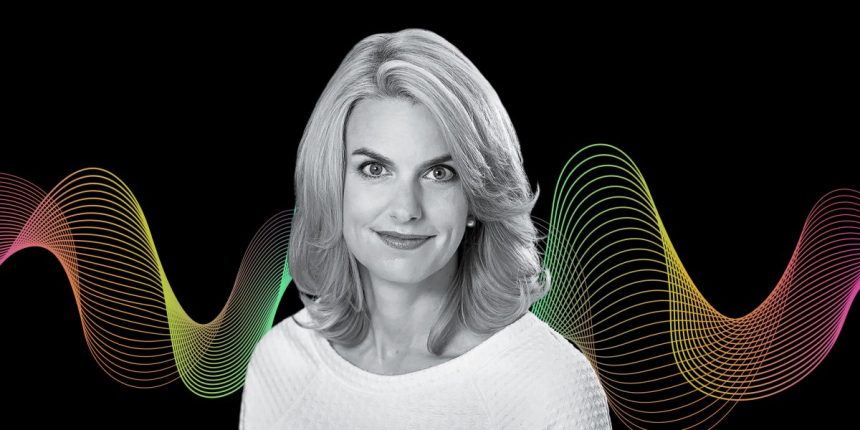On this week’s episode of Fortune‘s Leadership Next podcast, co-hosts Alan Murray and Michal Lev-Ram talk with GLAAD CEO Sarah Kate Ellis about the benefits of staying true to your company’s values; what happens when companies waffle on their commitment to Pride and the LGBTQ community; and why companies need to play both the short and long games.
Listen to the episode or read the full transcript below.
Transcript
Alan Murray: Leadership Next is powered by the folks at Deloitte, who, like me, are exploring the changing rules of business leadership and how CEOs are navigating this change.
Welcome to Leadership Next, the podcast about the changing rules of business leadership. I’m Alan Murray.
Michal Lev-Ram: And I’m Michal Lev-Ram. Alan, today’s episode is a bit different from what we typically do here at Leadership Next in our usual interviews. We’re focusing on a social and political issue that has really challenged business over the past few weeks and months in particular, and that’s how companies choose to celebrate Pride Month and address the LGBTQ rights topic overall. You know, really looking at whether they’re going to stick to these celebrations this month, in particular, in the face of quite a bit of pushback.
From a TV news report: “Target is pulling some LGBTQ+ merchandise from stores that had rolled out for Pride month after confrontations with some customers.”
From a TV news report: “Workers out a Columbus Starbucks are accusing the company of banning workers from installing decorations celebrating Pride Month. Starbucks Workers United alleges the company is directing locations in Ohio and other states to remove Pride displays.”
From a TV news report: “‘I got some Bud Lights for us.’ An ad with a transgender woman back in April prompted a conservative backlash online. Now analysts say Bud Light lost its top spot in U S. retail beer sales.”
From a TV news report: “Nobody likes spilling a drink, but pints of beer are going down the drain in Greenwich Village to send a message. In front of the famed Stonewall Inn, the site of the gay liberation movement, LGBTQ advocates poured cases of Anheuser-Busch beer into the gutter and they will ban it during Pride celebrations as well.”
Lev-Ram: So these clips reflect just a few of the situations where companies have faced backlash for celebrating Pride.
Murray: Yeah and, Michal, I see that as part of a bigger story that’s been playing out over the last decade. You know, if you go back 15 to 20 years or so, companies never spoke out on controversial social or political issues. They just didn’t talk about it at all. And we saw a dramatic change that really started around 2015 when Salesforce CEO Marc Benioff openly protested Indiana’s passage of a religious freedom law that was viewed as discriminatory against the LGBTQ community. And that was the beginning of really, geez, over the next few years an explosion of CEOs speaking out on on issues, and many of them supporting the rights of the LGBTQ community.
Lev-Ram: And right-wing activists have been really quick and really loud with their protests of these celebrations. You know, it’s hard to know how many are in this very vocal, you know, I think, minority, but one of them even was saying that they want to make Pride toxic for brands.
Murray: We’ve been watching how toxic these conversations have been for brands on the financial front, both Target and AB InBev saw their stocks downgraded earlier this month. Analysts say that’s partly because of the Pride controversy. Sales of Bud Light, as I said, are down pretty dramatically since early April when Bud first featured transgender influencer Dylan Mulvaney in some of its ads and boycotts ensued. But, Michal, what’s fascinating about these boycotts is that it’s hard to tell who is doing the boycotting. It seems like both ultraconservatives and the LGBTQ community are upset about what’s going on.
Lev-Ram: Yeah, I guess when you’ve pissed off everyone—well, in the media, you sometimes you feel like you did something right—but I don’t think that the same can be said here. You know, there, there has been some some flip-flopping, which tends to just, again, make everybody upset. You know, these companies had to make really quick decisions on how to respond. That’s not easy. And those responses have definitely varied. Bud Light is using a rebate program to try and win back customers now. Target pulled Pride-related merchandise from its stores. But then there are other brands like Cracker Barrel and North Face, and they’ve chosen to just double down in the face of this backlash, and they’ve continued their Pride celebrations and their ad campaigns just as planned.
Murray: Speaking of Target, Michal, we interviewed Brian Cornell, the CEO of Target, on May 1, and the episode aired May 16, a little over a week before Target made the decision to pull its Pride merchandise. We did ask him about his thoughts on the general pushback on woke capitalism. Obviously, we didn’t know what was coming on the Pride merchandise. And he didn’t speak specifically about that. But he did speak more broadly about how the company viewed its obligations to society.
Lev-Ram: Yeah and it was interesting, because we did not ask him specifically about that. We didn’t even know about the merchandise and this kind of like brewing, you know, issue, I guess. But it’s amazing how it’s still sort of, you know, our podcast episode was tied to some of the news. This stuff just spirals online and obviously, and, you know, in people’s minds. Going back to what you’re saying, Alan, about how hard it is telling who’s boycotting—at this point, both sides are kind of angry here. It’s also hard to tell—I mean, there are statistics out there, we know sort of where Americans are at in terms of LGBTQ rights today, as we’ll get into is an overwhelming majority. This stuff doesn’t seem like it should be controversial at this point. And yet, you know, it is.
Murray: So, this, of course, is one of the reasons why we started Leadership Next three years ago. We were really interested in the changing way that leaders were thinking about their social responsibilities, their expectations, their leadership role in broader society beyond the pure financial outlines of their business, and it’s why it’s something that we want to keep a very close eye on.
Lev-Ram: Yeah and obviously, you know, you and I can riff on this for all eternity, Alan. We both talk to a lot of business leaders, but we really wanted to invite an expert on this episode to talk to us about why this year’s Pride celebrations have been particularly radioactive for companies and some thoughts on how these companies have responded and how they could respond. So in this episode, we are welcoming Sarah Kate Ellis, the CEO of GLAAD.
Murray: Sarah Kate’s a former media executive. She comes from Time Inc. as we do, Michal.
Lev-Ram: Back in the day.
Murray: Those were the days. She took over as CEO of GLAAD in 2014. She’s led a major transformation of the organization from media watchdog group to a more powerful advocacy organization. And part of what GLAAD does now is advise companies on how best to support the LGBTQ community. In fact, one of the things they did recently was get a bunch of companies to sign on to a statement of support and include some really big household names like Cisco, Dow, Eli Lilly, HP, Intel, McKesson, etc. So it’s really rallying corporate support behind the LGBTQ community.
Lev-Ram: So without further ado, I think we’ve talked enough. Here’s our interview with Sarah Kate Ellis.
[Music. Interview begins.] Sarah Kate, thank you so much for joining us on the podcast. I want to start out just asking you, as someone on the outside looking in, Pride has felt different this time around. There’s a backlash we’re seeing, obviously, to corporate Pride initiatives. It’s been pretty fierce and pretty public. But I want to just start out by asking you from where you sit, does it feel different? And how so?
Sarah Kate Ellis: Well, thank you for having me. I’m thrilled to be here. And yeah, it’s a different year for Pride than we’ve seen in the past. And it shouldn’t be a surprise. We’ve seen the build-up to this. And we’ve seen the politicization of the LGBTQ community in the past year really be amped up by politicians. And so when you look at the landscape and what we’ve been dealing with as an LGBTQ community, we’ve seen over 500 anti-LGBTQ bills proposed this year. It’s an extraordinary number. Extraordinary. We’ve seen a good percentage of those pass through and become law, everything from banning books that include LGBTQ people to banning drag artist performance, and everything in between. And I think that when we look at the culture that’s being created right now, especially just by a handful of folks, it’s really bleeding into Pride. And so what used to be a moment of celebration and a moment to support our community has become another battleground. I think what’s really important here is because what we’re all drawn to, of course, are the headlines. That’s what we see. So everybody’s seeing the Anheuser-Busch headlines, and the Target headlines, but the real headlines here, in my opinion, are all the companies that are involved in Pride and who have stood up, who have not backed down and business has gone on as usual. So I feel as though oftentimes the headline really is, is that if you don’t go in 100% aligned with your values, and you leave room, and you back down to bullies and extremists, that’s going to hurt your business. So it’s a fascinating moment in time right now.
Murray: Sarah Kate, thank you so much for being here. It is an interesting moment. But let’s just dig in a little bit to the AB InBev case, because I think that one’s kind of stunning. Yes, it is a group of politicians and a small number of people who are making the noise, but AB InBev saw a 25% reduction in Bud Light sales after this issue came up. What does that tell you? What’s going on there? Twenty-five percent drop in sales.
Ellis: So, let’s step back for a second. What they did was they worked with an influencer, a transgender influencer, Dylan, who they sent a can to and who then posted on her site about Bud Light. That was met then with Kid Rock, using a gun to shoot But Light cans. Super extremist, and sending a very serious message. I’m curious, and what we’re looking at now is, where did that drop come from? Because I think it’s actually even on both sides. I think it’s from the LGBTQ community and our allies, just as much as it is from the opposition. Why? Because nobody’s happy with what Anheuser-Busch did. They lost across the board. They’ve lost their red audience. They’ve lost their progressive audience. And they’ve lost market share. And so companies like Nike, who actually did do a campaign with Dylan as well, and started to see this opposition come at them, they said no way, don’t do this. We are kind to each other. We treat people with respect. And that was the end of it. People need leaders. People want leaders. And when you fluctuate, they see an opening.
Lev-Ram: So, how do you advise companies work with companies on this front? I mean, we’ve definitely—like you’re saying, it’s hard to know from the numbers now, you know, it’s not getting into the detail of like, where’s that backlash coming from? Or the boycotts, right? We’ve seen this kind of backtracking messaging from from a number of other companies, too. Target as well. So what what do you what do you say to them?
Ellis: So we have actually, like you, started off with saying that this year is different than it has been in the past. We actually started a corporate Pride task force so that we could help with crisis comms, that we could help them stand their ground, honestly. Because the way I’m advising it is that there’s a short game and a long game, and you can win both, actually, but you have to stick with your values. And if you have been saying this is important to you, you value these marginalized communities, you’re putting your money and your marketing behind these communities, then when the going gets tough, you need to stand up and not back down. And if you stand up, you win. We saw it with North Face. We saw it with Nike. We’re seeing it Sesame Street. Like you can’t find a company, a consumer-facing company, really, that isn’t participating in Pride this year. But that’s not the headline. Those who back down to extremists and threats of violence are the ones who are making the headlines.
Murray: And that’s a really good point, Sarah Kate, and we talk about this a lot on Leadership Next. Because it’s, as you know, it’s not just LGBTQ rights. It’s also happening on the environment and on other issues. I think our sense, most of the people we’ve had on the show, they stick to their values. They want to make sure they create tolerant work places, but they’re really, really, really eager to stay out of the political debate. I noticed this morning there was a story about Starbucks. Apparently, store by store, you have a lot of them not displaying Pride banners this year unlike they have in the past, because they just don’t want to get caught up in the controversy. As you said, it’s a long game and a short game. How do you—and it’s understandable, particularly if you look at AB InBev, that you don’t want to get caught in the crossfire—how do you advise them to deal with that? To stand by their values, but keep their head low, is kind of what I hear people say.
Lev-Ram: And, and by the way, Sarah Kate, we should point out, you know, you’ve seen a lot of different surveys, polling Americans, you know, across the political spectrum, and both members of the LGBTQ community and not, and love to hear some of the stats from you. But you know, they do show that there is overwhelming majority support for gay rights, for being comfortable, for example, seeing LGBTQ people, couples in advertisements. So just to put another, you know, layer here, there is majority support for this.
Murray: There is majority support, but you know, if you’re Starbucks or you’re Walmart, you’re not playing to the majority, you want to play to everybody. And if you can sort of keep out of controversy. So I think that’s the dilemma that all these companies are wrestling.
Ellis: Well, so, I think there’s a lot here. You’re right, about three-quarters of Americans, over 70%, say they actually want to see companies supporting the LGBTQ community. Makes them feel better about the companies buying their products, they think they treat their employees better and their customers better. Ninety-four percent of Americans believe LGBTQ folks should be equal and should have equal rights in this country. So, it is a majority, it’s a super majority, honestly. And what we’re finding, though, is that there is a small minority with an outsize voice at this moment in time, and I think companies and their obligation—the landscape for companies have changed, right? We can all agree that we talk about stakeholders versus just shareholders, and this is where that’s really getting tested for the first time in a public space. And we’re seeing who’s standing up to this theory of being there for stakeholders versus just shareholders. And if you are, you’ll win. Here’s why. And this is why I didn’t, you know, we talked about this being a long game. When you look at Gen Z, 20% of Gen Z are LGBTQ. And we know that’s on the low end, that’s on the low end, we’ve polled this ourselves, we’ve seen that number actually as high as 40%. Think of that, and then add allies to that, and you are talking about a super majority. And those are the future employees and the future consumers of your business. So I think that’s the trap that AB got caught in, right? They have this older generation that’s going to phase out of their product, and they’re trying to attract a younger generation, and they’re seeing this generational clash happen in real time. It is so simple. It honestly is. I mean, everybody tries to make it this complex conversation. It’s the same thing that happens on the schoolyard. If you back down to a bully, a bully comes at you more. But if you stand your ground and you say you’re not going to be bullied, and sorry that person feels that way, but we’re all going to be nice to each other, we’re all going to be kind, then you see that they back down and they move on. And you’ve seen it across companies. One other thing that we’re doing, I wanted to get in there was that we’ve gone out to companies to sign a simple statement, just saying that you stand with LGBTQ folks, and we’ve had over 50 companies sign this. But you know, companies like Dow, Gilead, Pfizer, HP, Levi’s, they’re all saying, we’re standing with the LGBTQ community. And I think that, you know, this is the long game.
Murray: Just to follow up on that Sarah Kate, generally speaking, you find large companies are in the right place, even if tactically they misplay it?
Ellis: Absolutely. They, you know, look, it’s it’s an interesting thing that’s been happening over the past couple of years that I’ve seen is that when a crisis breaks around the LGBTQ community at these companies, used to be the C-suite that was calling us. Now it’s the C -suite and the ERG, the employee resource group, the LGBTQ employee resource group. So we’re now in a position of negotiating between these two, because they’re getting pressure from inside too from the LGBTQ community and their allies.
[Music starts]
Murray: Jason Girzadas, the CEO of Deloitte US is the sponsor of this podcast and joins me today. Welcome, Jason.
Jason Girzadas: Thank you, Alan. It’s great to be here.
Murray: Jason, everyone in business is talking about A.I. It clearly has the potential to dramatically disrupt almost every industry, but a lot of companies are struggling. What are some of the barriers that companies are facing in creating business value with A.I.?
Girzadas: Yeah, Alan, I think A.I. is on every client’s agenda. I think every CEO and board interaction and conversation that I’m a part of proves the fact that the promise of A.I. is widely held, and the hope is far and deep that it creates business value. But there are challenges to be sure. What we’ve seen is that the probability of success increases dramatically with strong executive sponsorship and leadership. There has to be a portfolio of investments around A.I., as well as to link the business ownership with technology leadership to see the value of A.I.-related investments. Over time, we’re optimistic and confident that the value will result, but it will be a portfolio where either short-term opportunities for automation improvements around productivity and cost takeout and then longer-term, medium-term opportunities for business model innovation that are truly transformational. So this is a classic case where it won’t be a single approach that realizes value for A.I.
Murray: It sounds like you take it a step at a time.
Girzadas: I think it’s definitely time, and also a portfolio recognizing that some investments will have short-term benefit where you can see immediate use cases creating financial and business impact, but longer-term opportunities to really invent different customer experiences, different business models, and ultimately create a longer-term benefit that we can’t even fully appreciate at this point in time.
Murray: Jason, thanks for your perspective. And thanks for sponsoring Leadership Next.
Girzadas: Thank you.
[Music ends]
Lev-Ram: And I was just going to ask real quick, just take taking a step back, you know, for some historical context. I mean, in the past, what has been the role of corporations in LGBTQ rights? In normalizing you know, representation?
Ellis: That’s such a great question. So, we wouldn’t be where we are today without corporate involvement, without our allies coming to the forefront and speaking up and using their leverage. Whether it be political leverage or economic leverage, to help build acceptance and help move policy forward for the LGBTQ community, everything from signing amicus briefs around marriage equality to using their marketing platforms to showcase LGBTQ folks. So it’s been really important. You know, we did a Trust Barometer with Edelman that looked specifically at LGBTQ in the workplace and what employees expect. And what’s fascinating is that the Edelman Trust Barometer already says that employees trust their CEOs and their companies more than they trust government, and sometimes more than they trust media. So they really look to this leadership and they expect more from them, right? They expect them to stand up and speak out for the LGBTQ community, and utilize and use their leverage, their points of leverage, whether it be economic, social, across the board. And I think that’s a really important point, because that’s only going to continue to grow. As we see these younger, you know, Alpha, our Generation Alpha and our Gen Z, they expect even more.
Murray: Yeah. And they do it because their employees want them to and their employees are where they get value in today’s economy. We should talk a little bit about the Disney example, because that’s such a fascinating one where the CEO, Bob Chapek, for two weeks, doesn’t say anything about the law in Florida which was viewed as discriminatory towards the LGBTQ community. Then he comes out and criticizes it. Then Florida attacks him. Then he loses his job, and now you have Bob Iger going back to the fight and saying, we’re not going to back down. We’re going to take you on. You must be encouraged by what Iger is doing.
Ellis: You know, I point to Iger as a real example of leadership, of CEO leadership. And I think, you know, we have been at any every intersection of that since the beginning of the Disney not standing up and speaking out on behalf of the LGBTQ community, yet speaking very highly of how supportive of the LGBTQ community they are. But then when, again, when the rubber hits the road, not using their leverage, especially their political power. I think when you look at this example, this is going to be taught for years in business schools, right? Because you could see where all of the missteps happened right at the front, and then you finally get the right CEO in who knows how to lead. And not only leads, but sets a path that is, you know, really changes the conversation at a level where this isn’t an attack on American values, because it’s an attack on American businesses. And I think that’s really important in all of this conversation that we’re having here is that I think this is an attack on free enterprise.
Murray: Yeah, that’s so, so well put, Sarah, and if I can just build on that a little bit. It’s not because Disney is trying to play politics, as governor DeSantis says. It’s because of the way Disney as a business creates value. I mean, what Bob Chapek found out was the creative community that makes the magic at Disney, they make the movies, they make the things that make Disney Disney, that they felt so strongly about this, that he didn’t have a choice. He didn’t have a choice but to respond to their concerns. You know, he met with them, and all of them had stories about how they were treated or bullied or mistreated when they were in school, and have deeply felt this whole question of restricting discussions of this in schools was by that creative community. And again, it’s not ultimately about politics. It’s about what Disney is as a business and how it creates value.
Lev-Ram: And by the way, we hear this over and over. I mean, Alan, we, you know, talk to Ed Bastian from Delta. Different issue, voting rights, but it came from his employee base, right? And I just wonder, Sarah, Kate, like, are you talking to companies about how to also amplify, communicate that to the public that this is coming from,you know—it’s not politics. A lot of it is driven by their employee base. And they need to, especially with this generational divide in the workforce, they need to listen to those voices. Does that factor into conversations today?
Ellis: I do think that when CEOs look at it as a human issue, and address it that way, and come at it from that perspective, that’s when they win. When they fall into the politics of this and they start firing or, you know, suspending marketing folks and distancing themselves from people that their company was sending product to or engaging with, that’s when they get into hot water, because they’re entering the political conversation and not keeping it a human conversation. And I think that’s what Chapek was doing. He was playing politics versus really listening to what people were saying in his company and outside what all of his consumers were saying. And that’s where, that’s when you win, right? Like, that’s when you really get to the essence of this, and they are humanizing it and not trying to not trying to appeal to either side, but to the human side. And that really matters. For us, the LGBTQ community, it is an issue of safety. And this is a really important, it is political for us, because we’ve been politicized, not because we feel political. But when you have over 500 bills proposed against you as a community, that takes a toll on you. And if you notice, in the past, a lot of CEOs used to stand up and say no to those bills. It’s been pretty quiet. So I’m not actually surprised by it all erupting now over this Pride season, because these companies who talk about supporting the LGBTQ community had been pretty silent over the past six months around all of these anti-LGBTQ bills.
Murray: Right. So, I would love your advice. I mean, here’s what I hear pretty consistently from CEOs which is, you are political, you can’t avoid being political. Their view is, hey, we want to stand by our values and we want to stand by our people, but we don’t want to get caught up in politics. Is that an impossible equation to solve? Or would you have advice to companies that feel that?
Ellis: I think it’s business. I think these bills, if passed, create problems for these companies. People need to move out of state. We see people fleeing Texas and Florida because they can’t raise their families, because they are being managed by the government now. And so I don’t, I think that it’s their job to control the narrative and not react to what the narrative is. If you’re reacting to the what the narrative is, you’ve already lost. But if you are creating the narrative and saying, this is about my employees, this is about my consumers, I need to make sure that they have the safest environment—whether it’s a retail environment, whether it’s a workplace environment, that they can raise their families in peace and freedom without being without having these restrictive laws put against them. So I think that it is, it is human, it is personal, and it is business. And you have to take it out of that political conversation.
Murray: Any other companies you point to who are doing that really well?
Ellis: Yeah, I think there are a lot of companies that are doing it really well. I think P&G is doing it really well. I, you know, I think Disney is doing it really well now. Nike has always been doing it really well. I mean, Nike leans into the personal, right? In really incredible political crosshairs and they always come out on top, because they show what it is to be human in all of it. And there are a lot of companies. Salesforce is always, Mark [Benioff] has always been at the forefront of this. You know who has been great too is Walmart. I mean, talk about everybody’s front door. I mean, that is America, right there. Walmart.
Murray: Yep, absolutely.
Lev-Ram: Before we go, Sarah Kate, I’d love to also hear from you, you know, things have evolved, obviously, over the last few years in regards to the political climate, corporate climate that we see, but but GLAAD has evolved as well under your leadership. Talk a little bit about your background and how representation in media advertising, you know, how this has become such a focus, and why that matters?
Ellis: Well, thank you for asking that. When I was brought into GLAAD it was really about modernizing it, because as you all know, the media landscape has changed so dramatically. And where GLAAD used to see ourselves as, you know, working with Hollywood exclusively and journalism exclusively, because those were the main shapers of culture in the past, that’s changed dramatically. Now CEOs have platforms, right? There’s Silicon Valley now that is social media, and that’s creating culture. Even D.C. and the Beltway is more of a cultural creator than it ever has been before. And so we’ve moved into all of those spaces. And the way I see it is that it’s really important for us as the LGBTQ organization for representation, that we provide representation in all of those spaces. So now we have a social media safety index, where we measure the top five social media companies on how they provide safety and an inclusive environment on their platforms for the LGBTQ community. We are going to Cannes, and we’ll be releasing our advertising index, where we’re measuring the top 10 advertisers by spend on how inclusive they are. And the headline is, out of all of their ads, only 3% include LGBTQ folks. So we have a lot of room for improvement there. So as you said, I have a background in media. I was at Time Inc. for a long time.
Murray: We’ve heard of that company.
Ellis: Remember that company? I miss that company. I loved it there. I was at Conde Nast. Didn’t love it as much, but got a lot of great world experience there.
Lev-Ram: We’ll leave it at that.
Ellis: But that helps inform. And you know, now we’re at Davos. I see you all at Davos, you know, we’re at Davos because that’s where the decisions are being made. That’s where the conversation is being had. And that’s where the culture is being set globally. And we want to make sure that the LGBTQ voice is at that table.
Lev-Ram: Sarah Kate, thank you so much for coming and sharing all of these insights. I know this is not the Pride month that I’m sure you wanted it to be. It’s a really tough time. But we really appreciate you being here and talking about this very, very important topic with us.
Ellis: Thank you. I really appreciate it. Anytime. I’m honored to be here. So thank you.
Murray: Leadership Next is edited and produced by Alexis Haut. Our theme is by Jason Snell. Our executive producer is Megan Arnold. Leadership Next is a product of Fortune Media.
Leadership Next episodes are produced by Fortune‘s editorial team. The views and opinions expressed by podcast speakers and guests are solely their own and do not reflect the opinions of Deloitte or its personnel. Nor does Deloitte advocate or endorse any individuals or entities featured on the episodes.
Read the full article here








